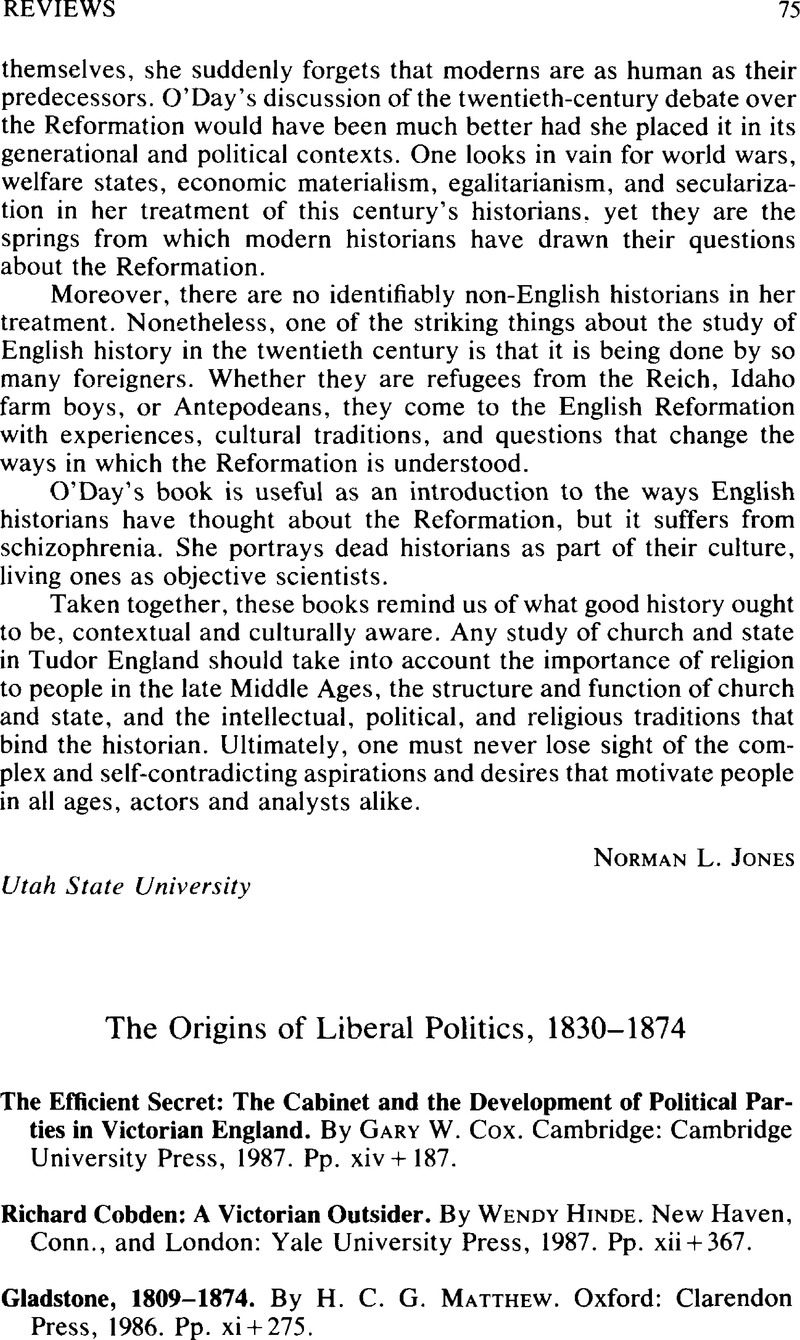No CrossRef data available.
Published online by Cambridge University Press: 10 January 2014

1 Vincent, John, The Formation of the British Liberal Party (New York, 1966), pp. xix–xxGoogle Scholar.
2 Rich, Henry, “Tory and Reform Associations,” Edinburgh Review 62, no. 125 (1835): 182, 184Google Scholar; Rice, Thomas Spring, “The Present State and Conduct of Parties,” Edinburgh Review 71, no. 143 (1840): 282Google Scholar.
3 SirMolesworth, William, “Terms of Alliance between Radicals and Whigs,” London and Westminster Review, American ed., 4 and 26, respectively, no. 2 (1837): 152Google Scholar; Mill, John Stuart, “Reorganization of the Reform Party,” London and Westminster Review, American ed., 32, no. 2 (1839): 252Google Scholar.
4 See Hansard's Parliamentary Debates, 3d ser., 98:859 (May 11, 1848)Google Scholar, for Cobden's assertion of his independence of all parties. See Hinde, , Richard Cobden, pp. 84–85Google Scholar, for the quote from Cobden's article in Tait's Edinburgh Magazine, November 1840.
5 Newbould, Ian, “Whiggery and the Growth of Party, 1830–1841: Organization and the Challenge of Reform,” Parliamentary History 4 (1985): 137–56CrossRefGoogle Scholar.
6 On the radicalization of the Liberal party, see Heyck, T. W., The Dimensions of British Radicalism: The Case of Ireland, 1874–95 (Urbana, Ill., 1974)Google Scholar. On the continuing problems radical sectionalism caused Liberal leaders, see Hamer, D. A., Liberal Politics in the Age of Gladstone and Rosebery: A Study in Leadership and Policy (Oxford, 1972)Google Scholar.
7 Vincent (p. 33) conveys this point rather melodramatically, saying that “Cobden's pamphlets were its [the Liberal party's] Das Kapital: Cobden its Marx.”
8 Adelman, Paul, Victorian Radicalism: The Middle-Class Experience, 1830–1914 (London and New York, 1984), pp. 2, 19–20Google Scholar; Roberts, David, “The Utilitarian Conscience,” in The Conscience of the Victorian State, ed. Marsh, Peter (Syracuse, 1979), pp. 39–72Google Scholar; Richard J. Helmstadter, “The Nonconformist Conscience,” in ibid., pp. 135–72.
9 Roberts, pp. 62–65. Helmstadter, pp. 145, 155–56.
10 Morley, John, The Life of Richard Cobden (Boston, 1881)Google Scholar; Edsall, Nicholas C., Richard Cobden: Independent Radical (Cambridge, Mass., and London, 1986)CrossRefGoogle Scholar; see also Read, Donald, Cobden and Bright: A Victorian Political Partnership (London, 1967)Google Scholar.
11 The most important biographies of Gladstone are Morley, John, The Life of William Ewart Gladstone, 3 vols. (London, 1903)Google Scholar; Magnus, Philip, Gladstone: A Biography (London, 1954)Google Scholar; Feuchtwanger, E. J., Gladstone (New York, 1975)Google Scholar; Shannon, Richard, Gladstone, 1809–1865 (London, 1982), vol. 1Google Scholar. The most ambitious attempt to analyze Gladstone as a politician is Hamer, who offers an interpretation of Gladstone as a political leader after 1868. The book, however, suffers from the crippling weakness that it ignores the moral Gladstone in seeking to explain the politician.
12 Foot, M. R. D. and Matthew, H. C. G., eds., The Gladstone Diaries (Oxford, 1968, 1974), vols. 1, 3Google Scholar, introductions. Schreuder, Deryck, “Gladstone and the Conscience of the State,” in Marsh, , ed., pp. 73–134Google Scholar; Butler, Perry, Gladstone: Church, State, and Tractarianism (Oxford, 1982)Google Scholar. Helmstadter, Richard, “Conscience and Politics: Gladstone's First Book,” in The Gladstonian Turn of Mind: Essays Presented to J. B. Conacher, ed. Kizer, Bruce L. (Toronto, Buffalo, and London, 1985), pp. 3–42Google Scholar; Kenyon, John, “Gladstone and the Anglican High Churchmen, 1845–52,” in Kinzer, , ed., pp. 43–62Google Scholar.
13 These represent the interpretations of Butler, Matthew, Butler, and Schreuder, respectively. See n. 12 above.
14 Brent, Richard, Liberal Anglican Politics: Whiggery, Religion, and Reform 1830–1841 (Oxford, 1987)Google Scholar. For the Radicals and Nonconformists, see n. 8 above.
15 Machin, G. I. T., Politics and the Churches in Great Britain, 1832 to 1868 (Oxford, 1977), pp. 324–30Google Scholar.
16 Ibid, pp. 193–95, 221–25, 230–33, 290. Kerr, Donal A., Peel, Priests and Politics: Sir Robert Peel's Administration and the Roman Catholic Church in Ireland, 1841–1846 (Oxford, 1982)Google Scholar.
17 Brent, pp. 43–63.